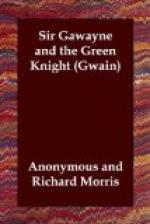1900 [D] Þe wy3e wat3 war of þe wylde, & warly abides,
& brayde3 out þe bry3t bronde, & at þe best caste3;
& he schunt for þe scharp, & schulde haf arered,
[E] A rach rapes hym to, ry3t er he my3t,
1904 & ry3t bifore þe hors fete þay fel on hym alle,
& woried me þis wyly wyth a wroth noyse.
[F] Þe lorde ly3te3 bilyue, & cache3 by[1] sone,
Rased hym ful radly out of þe rach mouþes,
1908 Halde3 he3e ouer his hede, halowe3 faste,
& þer bayen hym mony bray[2] hounde3;
[G] Huntes hy3ed hem þeder, with horne3 ful mony,
Ay re-chatande ary3t til þay þe renk se3en;
1912 Bi þat wat3 comen his compeyny noble,
Alle þat euer ber bugle blowed at ones,
[H] & alle þise oþer halowed, þat hade no hornes,
Hit wat3 þe myriest mute þat euer men herde,
1916 Þe rich rurd þat þer wat3 raysed for renaude saule,
with lote;
[I] Hor hounde3 þay þer rewarde,
Her[3] hede3 þay fawne & frote,
1920 [J] & syþen þay tan reynarde,
& tyrnen of his cote.
[Sidenote A: Gawayne’s host is still in the field.] [Sidenote B: He has destroyed the fox.] [Sidenote C: He spied Reynard coming through a “rough grove,”] [Sidenote D: and tried to hit him with his sword.] [Sidenote E: The fox “shunts,” and is seized by one of the dogs.] [Sidenote F: The lord takes him out of the hound’s mouth.] [Sidenote G: Hunters hasten thither with horns full many.] [Sidenote H: It was the merriest meet that ever was heard.] [Sidenote I: The hounds are rewarded,] [Sidenote J: and then they take Reynard and “turn off his coat.”] [Footnote 1: hym (?).] [Footnote 2: braþ (?).] [Footnote 3: Her her, in Ms.]
XXXII.
[A] & þenne þay helden to home,
for hit wat3 nie3 ny3t,
Strakande ful stoutly in hor store horne3;
1924 [B] Þe lorde is ly3t at þe laste at hys lef home,
Fynde3 fire vpon flet, þe freke þer by-side,
Sir Gawayn þe gode, þat glad wat3 with alle,
[C] Among þe ladies for luf he ladde much ioye,
1928 He were a bleaunt of blwe, þat bradde to
þe erþe,
His surkot semed hym wel, þat softe wat3
forred,
& his hode of þat ilke henged on his schulder,
[D] Blande al of blaunner were boþe al aboute.
1932 He mete3 me þis god mon in mydde3 þe flore,
& al with gomen he hym gret, & goudly he
sayde,
“I schal fylle vpon fyrst oure forwarde3
nouþe,
Þat we spedly han spoken, þer spared wat3
no drynk;” [Fol. 117.]
1936 [E] Þen acoles he [þe] kny3t, & kysses hym þryes,
[F] As sauerly & sadly as he hem sette couþe.
[G] “Bi Kryst,” quod þat oþer kny3t,
“3e cach much sele,
In cheuisaunce of þis chaffer, 3if 3e hade
goud chepe3.”
1940 “3e of þe chepe no charg,” quod
chefly þat oþer,
“As is pertly payed þe chepe3 þat I
a3te.”
“Mary,” quod þat oþer mon, “myn
is bi-hynde,
[H] For I haf hunted al þis day, & no3t haf I
geten,
1944 [I] Bot þis foule fox felle, þe fende haf þe




